英语中常见介词用法总结
- 格式:doc
- 大小:162.00 KB
- 文档页数:18

40个英语介词用法总结40个英语介词用法总结1. in: 表示在某个地方或时间内,例如:in the park, in the morning2. on: 表示在某个表面或时间点上,例如:on the table, on Monday3. at: 表示在某个地点或时刻,例如:at the cinema, at 9 o'clock4. by: 表示通过某种方式或在某个时间之前,例如:by car, by tomorrow5. for: 表示为了某个目的或一段时间,例如:for a party, for a week6. with: 表示伴随或使用某物,例如:with friends, with a pen7. to: 表示移动到某个地方或给予某人,例如:go to school, give it to me8. from: 表示起始点或来源,例如:from home, from China9. into: 表示进入某个地点或状态的转变,例如:jump into the water, turn into a butterfly10. out: 表示从某地点离开或移动到室外,例如:go out, look out of the window11. up: 表示向上移动或增加,例如:climb up the stairs,wake up12. down: 表示向下移动或减少,例如:walk down the hill, calm down13. about: 表示关于某事或在某个范围内,例如:talk about the movie, wander about the city14. off: 表示离开或关闭,例如:get off the bus, turnoff the lights15. on: 表示打开或激活,例如:turn on the TV, switch on the computer16. over: 表示越过或在某地上方,例如:jump over the fence, fly over the city17. under: 表示在某物下面或被控制或影响,例如:hide under the bed, live under his rules18. with: 表示具有某种特征或和某人一起做某事,例如:a man with blue eyes, dance with me19. without: 表示没有某物或在缺乏某物的情况下,例如:go without food, live without regret20. by: 表示通过某种方式,例如:learn by doing, go by bus21. through: 表示穿过某物或完成某事,例如:walk through the door, go through the documents22. across: 表示横穿某物或在某个范围内,例如:swimacross the river, all across the world23. between: 表示在两个事物之间或在某个时间段,例如:choose between two options, between 9 and 10 o'clock24. among: 表示在三个或三个以上事物之间或在某群人中,例如:share among friends, discuss among colleagues25. around: 表示在周围或在某个时间点附近,例如:walk around the park, around midnight26. through: 表示通过某事物或在某段时间内,例如:read through the book, work through the night27. against: 表示反对或靠在某物上,例如:fight against injustice, lean against the wall28. for: 表示代表或支持某人或某事,例如:vote for a candidate, fight for freedom29. towards: 表示朝向某个方向或对某人有好感,例如:walk towards the beach, feel towards someone30. within: 表示在某个时间或范围内,例如:arrive within an hour, within the city limits31. beyond: 表示超出某个界限或超过某个程度,例如:beyond expectations, beyond the horizon32. along: 表示沿着某个路线或伴随某人一起,例如:walk along the street, sing along with the song33. above: 表示在某物之上或高于某个程度,例如:flyabove the clouds, above average34. below: 表示在某物之下或低于某个程度,例如:swim below the surface, below freezing35. beside: 表示在某物旁边或和某人一起,例如:sit beside me, beside the lake36. near: 表示在某物附近或接近某个时间,例如:live near the beach, near the end37. past: 表示经过某个地点或在某个时间之后,例如:walk past the store, past midnight38. around: 表示在周围或大约某个数量,例如:look around the room, around 20 people39. after: 表示在某个时间之后或追求某人或某事,例如:after dinner, run after the dog40. before: 表示在某个时间之前或在某个事件之前,例如:before sunrise, before the meeting这些介词是英语中常用的一些基本介词,它们在表达地点、时间、方式等方面起到了重要的作用。

常见的英语介词及其用法英语介词的用法非常灵活,以下是常见的英语介词及其用法:1.表示地理位置的介词:•at:用于表示具体的位置,如at the table(在桌子旁)•in:用于表示在某个大地方或空间中,如in the house(在房子里)•on:用于表示在某个平面上或物体表面上,如on the table (在桌子上)•to:用于表示方向,如to the left(向左)案例:He lives in a small town near London.(他住在伦敦附近的一个小城镇里。
)2.表示时间的介词:•at:用于表示具体的时间点或时刻,如at noon(在中午)•in:用于表示在一个时间段内,如in the morning(在早晨)•on:用于表示在某个具体日期或时间范围,如on Monday (在星期一)•since:用于表示从某个时间点或时刻开始,如since last week(从上周开始)案例:I usually go to bed at 11 o'clock.(我通常在11点睡觉。
)3.表示方式的介词:•by:用于表示通过某种方式或交通工具,如by bus(乘公共汽车)•with:用于表示使用某种工具或方法,如with a knife(用刀子)•in:用于表示使用某种语言或穿着某种衣服,如in English (用英语)•on:用于表示在某种媒介上,如on TV(在电视上)案例:We usually communicate with each other by email.(我们通常通过电子邮件彼此沟通。
)4.表示原因的介词:•for:用于表示为了某个目的或原因,如for help(为了寻求帮助)•from:用于表示由于某个来源或原因,如from fear(由于恐惧)•about:用于表示关于某个话题或事件,如about the weather (关于天气)案例:She is studying for the exam.(她正在为考试而学习。

英语中常见介词用法总结answer for对…负责look for寻找, prepare for为…作准备例如:He is prepare for the coming English test. 他为即将到来的英语考试做准备。
He who would look for pearls must dive below.要想找到珍珠,必须潜到海底。
b)动词+sb.+ for +sth.。
for表示原因或目的:ask for要求得到, pay for花钱买thank for对…表示谢意。
例如:thanks for your help. 谢谢你的帮助。
2. be +形容词+for。
for表作用、目的、对人或物有某种情绪等:be bad for有害于be good for利于, be famous for以…出名be late for迟到, be sorry for为…而后悔be useful for对…有作用。
例如:He is famous for his great talent. 因伟大的天赋而出名。
3.for+名词构成的词组:for ever永远,for example例如, for free免费,for fun为了好玩, for oneself替自己,4.动词+副词/名词+for构成的短语:have a gift for有某方面的天赋。
五、From1. 动词+froma)动词+ from。
from表示“来源、原因、起始”等:come from来自,date from追溯, die from死于, hear from收到来信,learn from向某人学习例如:she comes from China.b)动词+ sth./sb. +from + sth./ sb. /a place。
from表示“来源、免于”等:keep from阻止做 stop from阻止。
例如:Stop the child from crying.2. be +形容词+ from。

英语介词用法详解英语介词是连接词与词之间关系的重要语法成分,它们用于表示空间、时间、关系等概念。
正确的使用介词是英语学习的基础之一。
本文将详细介绍英语介词的常见用法。
一、表示方向和位置的介词1. In(在):用于大的地点范围之内,表示“在……里面”。
- There is a book on the desk.- I live in New York.2. On(在、在上、在……上面):用于平面、表面或边界之上。
- The cat is on the table.- The painting hangs on the wall.3. At(在、在……附近):用于特定的地点或位置。
- I met him at the park.- We will meet at the restaurant.4. Under(在……下面):表示相对高度或遮挡。
- The cat is under the table.- He found his keys under the sofa.5. Behind(在……后面):表示在某物后面。
- The car is parked behind the house.- She is hiding behind the tree.6. Beside(在……旁边):表示在某物的旁边。
- My house is beside the park.- She sat beside her friends.7. Inside(在……里面):表示在某物的内部。
- The wallet is inside the bag.- There is a surprise inside the box.8. Outside(在……外面):表示在某物的外部。
- The children are playing outside the house.- Don't forget to lock the door when you go outside.二、表示时间的介词1. On(在某天):用于特定的日期。

介词用法总结介词是英语语法中一个重要的词类,用于表示名词、代词、动词和形容词等与其他词或短语之间的关系。
在不同的句子和语境中,介词具有不同的用法。
本文将对介词的用法进行总结,并提供相关的例句。
一、表示位置关系的介词1. in:在…之中,在(具体范围)。
例句:He is waiting in the car.(他正在车里等待。
)2. on:在…之上,在(水平面)。
例句:The book is on the table.(书在桌子上。
)3. at:在…地方,在(具体点)。
例句:She is studying at the library.(她在图书馆学习。
)4. by:在…旁边,靠近(某物)。
例句:He is standing by the door.(他站在门旁边。
)5. under:在…下面,在(某物)的底部。
例句:The cat is hiding under the bed.(猫在床下躲藏。
)6. between:在…之间(两者之间)。
例句:The restaurant is located between the bank and the supermarket.(这家餐厅位于银行和超市之间。
)二、表示时间关系的介词1. at:在(具体时间点)。
例句:She will meet her friend at 8 o'clock.(她将在8点钟见她的朋友。
)2. on:在(具体日期或星期)。
例句:I have a meeting on Monday.(星期一我有个会议。
)3. in:在(一段时间内)。
例句:He will travel to Europe in summer.(他将在夏天去欧洲旅行。
)4. during:在…期间,表示全程。
例句:I read a book during the flight.(我在飞行途中读了一本书。
)5. for:持续时间,表示时间段。
例句:They have been married for ten years.(他们已经结婚十年了。

史上超全的英语介词用法归纳总结!不看太可惜了英语介词是一种非常重要的语法成分,用于表示名词与其他句子成分之间的关系。
以下是史上超全的英语介词用法归纳总结:1.基本介词:- in:在...内部- on:在...表面- at:在...位置或时间点- by:通过其中一种方式- with:用物- from:从...来- to:到...去- for:为了- of:属于...的2.时间介词:- in:用于特定时间段,如in the morning(在早上)- on:用于特定日期或星期,如on Monday(在星期一)- at:用于具体时间点,如at 3 o'clock(在3点钟)3.地点介词:- in:用于大的地理范围,如in China(在中国)- on:用于较小的地理范围或表面,如on the street(在街上)- at:用于具体地点,如at the supermarket(在超市)4.方向介词:- to:表示到达一些地方,如go to school(去学校)- into:表示进入一些地方,如go into the house(进入房子)- out of:表示离开一些地方,如get out of the car(离开车)5.原因介词:- because of:由于,如He is late because of the traffic(他因为交通堵塞而迟到)- due to:由于,如The flight was canceled due to bad weather(因为恶劣天气,航班被取消)6.动词短语介词:- look after:照顾,如She looks after her younger brother (她照顾她的弟弟)- take care of:照顾,如He takes care of his plants(他照顾他的植物)7.形容词短语介词:- interested in:对...感兴趣,如She is interested in music (她对音乐感兴趣)- good at:擅长...,如He is good at playing basketball(他擅长打篮球)8.其他常见介词用法:- with regard to:关于,如With regard to the matter, I have something to say(关于这件事,我有些话要说)- instead of:代替,如I will go instead of him(我将代替他去)- according to:根据,如According to the weather forecast, it will rain tomorrow(根据天气预报,明天会下雨)以上是一些常见的英语介词用法总结,希望能帮到你!。

40个介词用法总结介词是英语中非常重要的一类词性,它在句子中起着连接词与词、短语与短语的作用。
介词的正确使用对于句子的表达和理解至关重要。
下面将介绍40个常见介词的用法总结,希望能够帮助大家更好地掌握介词的用法。
1. about。
介词about表示“关于”,用于询问或表达主题或内容。
例如,What are you talking about?(你在谈论什么?)。
2. above。
介词above表示“在……之上”,用于表示位置关系。
例如,The sun is above the clouds.(太阳在云层之上。
)。
3. across。
介词across表示“横过,穿过”,用于表示横跨某个区域或穿过某个物体。
例如,We walked across the bridge.(我们走过了桥。
)。
4. after。
介词after表示“在……之后”,用于表示时间先后关系。
例如,We'll go for a walk after dinner.(晚饭后我们会去散步。
)。
5. against。
介词against表示“靠着,依靠”,用于表示两个物体之间的接触或支撑关系。
例如,He leaned against the wall.(他靠在墙上。
)。
6. along。
介词along表示“沿着”,用于表示沿着某个方向或路线。
例如,We walked along the river.(我们沿着河边走。
)。
7. amid。
介词amid表示“在……之中”,用于表示某个场所或环境中。
例如,The children played happily amid the flowers.(孩子们在花丛中快乐地玩耍。
)。
8. among。
介词among表示“在……之中”,用于表示三个或三个以上的人或物之间的关系。
例如,She is among the top students in her class.(她是班里的尖子学生之一。
)。
9. around。

介词的用法及例句引言:介词是英语中非常重要的语法成分之一,它可以用来表示时间、地点、方式、目的等等关系。
正确使用介词不仅能够提升语言表达的准确性,还能让我们的表达更加流利自然。
本文将详细介绍介词的用法,并给出一些常见的例句来帮助读者更好地掌握。
一、表示时间关系的介词:1. On例句:I have a meeting on Monday.解析:这里的on指明了会议在周一这个具体日期上进行。
2. In例句:The concert will be held in November.解析:这里的in表示在11月份这个时间段内举行音乐会。
3. At例句:We will meet at 9 o'clock tomorrow morning.解析:at用于表示具体时间点,此处表示我们明天早上9点见面。
二、表示地点关系的介词:1. In例句:She lives in New York City.解析:in用于表示所处位置或范围,此处指她住在纽约市内。
例句:I will meet you at the coffee shop.解析:at表示在某个特定地方遇见某人,这里指我将在咖啡店见你。
3. On例句:The book is on the table.解析:on表示在某物的表面,这里指书本放在桌子上。
三、表示方式关系的介词:1. By例句:She goes to work by bus.解析:by表示通过某种交通工具或方式进行,这里指她乘公交车上班。
2. With例句:He cuts the meat with a knife.解析:with表示使用某物进行操作,这里指他用刀切肉。
3. Like例句:He speaks English like a native speaker.解析:like表示像某人或某事物一样,这里指他说英语像个母语者一样流利。
四、表示目的关系的介词:1. For例句:I bought some flowers for my mother.解析:for表示为了某人或某事物而做,这里我买花是为了给妈妈。
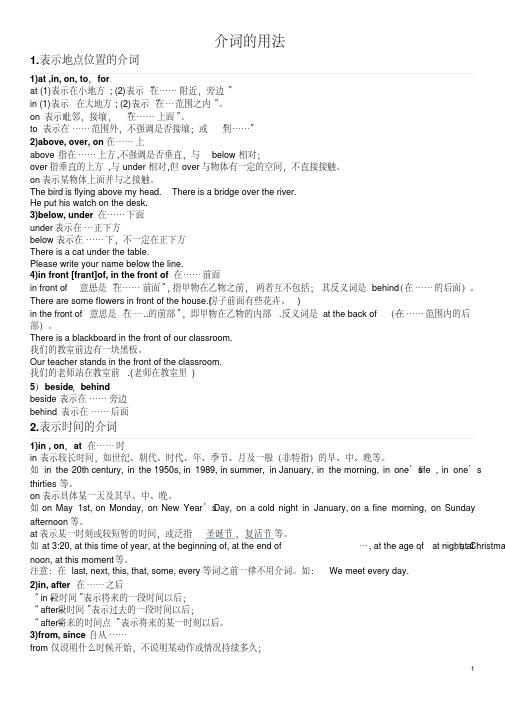
介词的用法1.表示地点位置的介词1)at ,in, on, to,forat (1)表示在小地方; (2)表示“在……附近,旁边”in (1)表示在大地方; (2)表示“在…范围之内”。
on 表示毗邻,接壤,“在……上面”。
to 表示在……范围外,不强调是否接壤;或“到……”2)above, over, on 在……上above 指在……上方,不强调是否垂直,与below相对;over指垂直的上方,与under相对,但over与物体有一定的空间,不直接接触。
on表示某物体上面并与之接触。
The bird is flying above my head. There is a bridge over the river.He put his watch on the desk.3)below, under 在……下面under表示在…正下方below表示在……下,不一定在正下方There is a cat under the table.Please write your name below the line.4)in front [frant]of, in the front of在……前面意思是“在……前面”,指甲物在乙物之前,两者互不包括;其反义词是behind(在……的后面)。
in front of…There are some flowers in front of the house.(房子前面有些花卉。
)in the front of 意思是“在…..的前部”,即甲物在乙物的内部.反义词是at the back of…(在……范围内的后部)。
There is a blackboard in the front of our classroom.我们的教室前边有一块黑板。
Our teacher stands in the front of the classroom.我们的老师站在教室前.(老师在教室里)5)beside,behindbeside 表示在……旁边behind 表示在……后面2.表示时间的介词1)in , on,at 在……时in表示较长时间,如世纪、朝代、时代、年、季节、月及一般(非特指)的早、中、晚等。
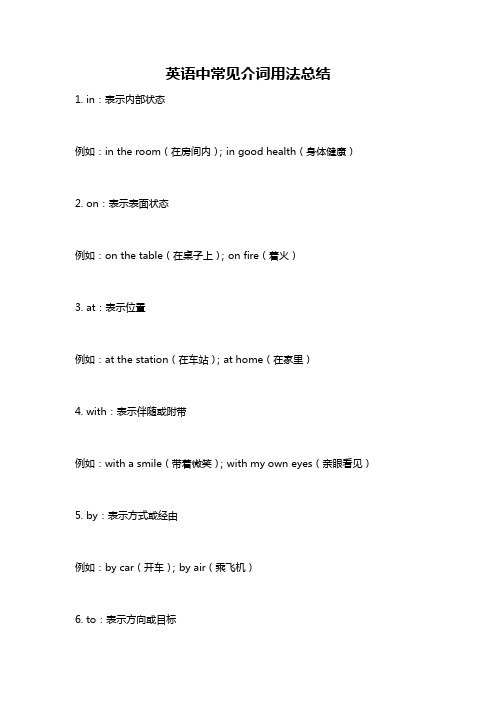
英语中常见介词用法总结
1. in:表示内部状态
例如:in the room(在房间内);in good health(身体健康)2. on:表示表面状态
例如:on the table(在桌子上);on fire(着火)
3. at:表示位置
例如:at the station(在车站);at home(在家里)
4. with:表示伴随或附带
例如:with a smile(带着微笑);with my own eyes(亲眼看见)5. by:表示方式或经由
例如:by car(开车);by air(乘飞机)
6. to:表示方向或目标
例如:to the park(去公园);to the moon(到月球)
7. from:表示出发地或来源
例如:from Beijing(来自北京);from the magazine(从杂志中)
8. for:表示目的或用途
例如:for a birthday party(为了生日派对);for writing(用于写作)
9. of:表示属于或关系
例如:the book of Harry Potter(哈利·波特的书);the sister of Mary(玛丽的姐姐)
10. with:表示具有或伴随
例如:a man with a gun(拿着枪的人);a girl with long hair(长发女孩)。

英语介词的用法归纳英语介词是连接词汇与词汇,短语与短语之间,在句子中起到连接作用的词类。
它们用来确定词与词、短语与短语之间的关系,并表示时间、空间、原因、目的、手段、方式等等。
英语语法中常见的介词有约40多个,下面将对常见的英语介词进行归纳总结,以供参考。
一、表示时间的介词:1. at:表示具体的时间点,通常与表示时间的名词连用;也可表示某些特定的固定日、节日或场所。
例句:at 6 o'clock, at sunrise, at school2. in:表示较长的时间段、季节、月份、年、部门和地方等。
例句:in summer, in 2019, in London3. on:表示具体的某一天或某一天的上午/下午/晚上等。
例句:on Monday, on the morning of May 1st4. by:表示“最晚”、“到”的意思,通常表示某个时间点之前。
例句:by 10 o'clock, by the end of the year5. for:表示持续的时间段,通常与表示时间的名词连用。
例句:for three hours, for a week二、表示空间的介词:1. in:表示在某个或某些三维空间范围之内,也可表示在某个具体的区域或地点。
例句:in the room, in the park2. on:表示在某个平面面上,通常用来表示地点。
例句:on the table, on the wall3. at:表示在某个具体的地点或位置。
例句:at the door, at the bus stop4. by:表示“靠近”、“经过”等含义。
例句:by the river, by the window5. between:表示在两个或两个以上的物体或位置之间。
例句:between two mountains, between the buildings6. among:表示在三个或三个以上的物体或位置之间。

语法|英语介词知识点用法总结!1.In(在,表示时间、地点、状态):- 表示具体的时间点或时间段:in the morning(早晨)、in May(五月)、in 2024(2024年)- 表示地点:in the park(在公园里)、in London(在伦敦)- 表示状态:in trouble(陷入困境)、in love(恋爱中)2.On(在,表示时间、地点、表面):- 表示具体的日期或星期几:on Monday(星期一)、on December25th(12月25日)- 表示地点:on the bus(在公交车上)、on Main Street(在主街上)- 表示表面:on the table(在桌子上)3.At(在,表示时间、地点):- 表示具体的时间:at 8 o'clock(在8点钟)、at noon(在中午)- 表示地点:at the cinema(在电影院)、at home(在家)4.To(到,表示方向或目的地):- 表示目的地:a trip to Paris(巴黎之行)、a letter to John (写给约翰的信)- 表示出发地:a flight from New York(从纽约起飞的航班)、a train from London(从伦敦开出的火车)- 表示原因:suffer from a cold(患感冒)6. For(为了,表示目的、受益人):- 表示目的:study for the exam(为考试而学习)、buy flowers for my mother(给母亲买花)- 表示受益人:a gift for you(给你的礼物)7. With(和,表示伴随、使用、具备):- 表示伴随:go shopping with friends(和朋友一起购物)、have dinner with family(和家人一起吃晚饭)- 表示使用:write with a pen(用钢笔写)- 表示具备:a girl with long hair(一位长发的女孩)以上是一些常见的英语介词及其用法总结,介词在句子中使用灵活多样,需要根据具体语境来选择适当的介词。

英语介词用法归纳总结1.关于时间:- at: 用于具体的时间点,例如at 6 o'clock(在6点),at noon (在中午)- in: 用于较长的时间段,例如in the morning(在早上),inMay(在五月)- on: 用于具体的日期或特殊的时间,例如on Monday(在星期一),on Christmas Day(在圣诞节)2.关于地点:- at: 用于具体的地址或地点,例如at home(在家),at the cinema(在电影院)- in: 用于大的地理区域或封闭区域,例如in London(在伦敦),in the park(在公园)- on: 用于具体的路线或表面,例如on the street(在街上),on the table(在桌子上)3.关于方式和原因:- by: 表示通过其中一种方式或方法,例如by bus(乘坐公交车),by email(通过电子邮件)- for: 表示出于其中一种目的或原因,例如for fun(为了好玩),for health(为了健康)4.关于原因和目的:- for: 表示给予或服务于人或物,例如a gift for you(给你的礼物),a book for studying(用于学习的书籍)- to: 表示朝向人或地,例如go to school(去学校),give something to someone(给人东西)5.关于关系和方向:- at: 用于指定位置,例如at the corner(在拐角处),at thetop(在顶部)- in: 用于被围绕或包围的地方,例如in the box(在盒子里),in the car(在车里)- on: 用于接触或依靠的表面,例如on the wall(在墙上),onthe floor(在地板上)6.关于运动和位置:- into: 表示进入一些地方,例如go into the room(进入房间),jump into the water(跳入水中)- out of: 表示离开一些地方,例如get out of the car(从车里出来),jump out of the window(从窗户跳出)7.其他常见用法:- with: 表示伴随或携带人或物,例如go with friends(和朋友一起去),a bag with books(带有书的袋子)- by: 表示通过其中一种交通工具或方法,例如by train(乘坐火车),by walking(步行)- to: 表示给予人或处,例如give something to someone(给人东西),send a message to a friend(给朋友发消息)以上是一些常见的英语介词用法归纳总结,但是要注意,有些介词的用法是可以根据具体语境变化的,所以需要根据具体情况来选择合适的介词使用。
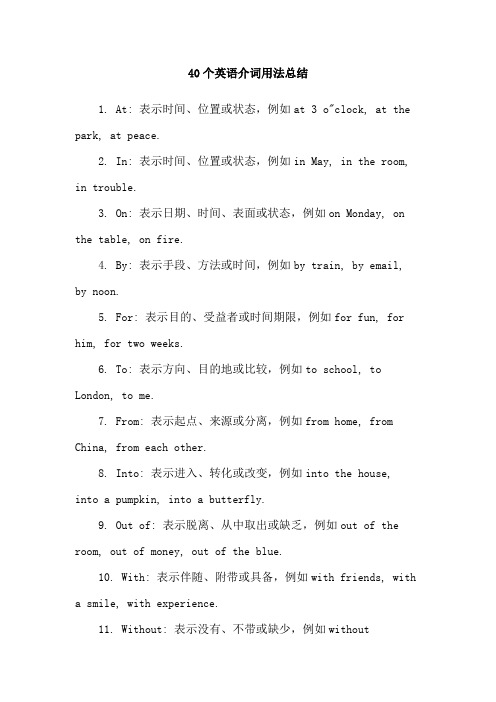
40个英语介词用法总结1. At: 表示时间、位置或状态,例如at 3 o"clock, at the park, at peace.2. In: 表示时间、位置或状态,例如in May, in the room, in trouble.3. On: 表示日期、时间、表面或状态,例如on Monday, on the table, on fire.4. By: 表示手段、方法或时间,例如by train, by email, by noon.5. For: 表示目的、受益者或时间期限,例如for fun, for him, for two weeks.6. To: 表示方向、目的地或比较,例如to school, to London, to me.7. From: 表示起点、来源或分离,例如from home, from China, from each other.8. Into: 表示进入、转化或改变,例如into the house,into a pumpkin, into a butterfly.9. Out of: 表示脱离、从中取出或缺乏,例如out of the room, out of money, out of the blue.10. With: 表示伴随、附带或具备,例如with friends, witha smile, with experience.11. Without: 表示没有、不带或缺少,例如withoutpermission, without shoes, without doubt.12. Over: 表示覆盖、超过或结束,例如over the roof, over the limit, over and done with.13. Under: 表示在下面、被支配或不足,例如under the table, under his control, under budget.14. About: 表示关于、大约或忙于,例如about the movie, about 10 dollars, about to leave.15. Above: 表示在上面、高于或超过,例如above the clouds, above average, above suspicion.16. Below: 表示在下面、低于或不足,例如below the surface, below freezing, below par.17. Across: 表示横穿、相交或涉及,例如across the street, across the board, across his mind.18. Beyond: 表示超出、远离或除了,例如beyond repair, beyond belief, beyond her control.19. Around: 表示周围、附近或环绕,例如around the corner, around the clock, around the world.20. Before: 表示以前、在前面或比较,例如before noon, before the house, before his time.21. Behind: 表示在后面、落后或背后,例如behind the house, behind schedule, behind the scenes.22. Beside: 表示在旁边、与...相比或附加,例如besidethe river, beside myself, beside the point.23. Inside: 表示内部、在里面或被包含,例如inside the box, inside the building, inside information.24. Outside: 表示外部、在外面或超出,例如outside the house, outside the box, outside the norm.25. Through: 表示穿过、经过或完成,例如through the door, through the park, through with it.26. Throughout: 表示遍布、贯穿或在整个期间,例如throughout the city, throughout history, throughout the day.27. Towards: 表示朝向、对于或接近,例如towards the sun, towards him, towards the end.28. Against: 表示反对、抵抗或紧挨着,例如against the law, against the current, against the wall.29. Among: 表示在...之中、相互之间或被分配到,例如among friends, among the stars, among the winners.30. Between: 表示在两者之间、在中间或相互之间,例如between two trees, between classes, between you and me.31. Within: 表示在内部、在范围之内或在规定时间内,例如within the house, within the budget, within a week.32. Without: 表示在外面、没有或不用,例如without the room, without a doubt, without further ado.33. Beneath: 表示在下面、低于或不足,例如beneath the surface, beneath his dignity, beneath contempt.34. Beside: 表示在旁边、与...相比或附加,例如beside the river, beside myself, beside the point.35. Into: 表示进入、转化或改变,例如into the house, into a pumpkin, into a butterfly.36. Upon: 表示在...之上、一旦发生或基于,例如upon the hill, upon arrival, upon further consideration.37. With: 表示伴随、附带或具备,例如with friends, witha smile, with experience.38. Within: 表示在内部、在范围之内或在规定时间内,例如within the house, within the budget, within a week.39. Without: 表示没有、不带或缺少,例如without permission, without shoes, without doubt.40. Beneath: 表示在下面、低于或不足,例如beneath the surface, beneath his dignity, beneath contempt.。

高中英语中常见的介词用法总结1. in:表示在某个范围、实体或地点之内。
例如:in the park(在公园里)、in the morning(在早晨)。
in:表示在某个范围、实体或地点之内。
例如:in the park(在公园里)、in the morning (在早晨)。
2. on:表示在某个表面、时间或日子之上。
例如:on the table (在桌子上)、on Monday(在星期一)。
on:表示在某个表面、时间或日子之上。
例如:on the table(在桌子上)、on Monday(在星期一)。
3. at:表示在某个地点、时间或状态。
例如:at the cinema(在电影院)、at 9 o'clock(在9点钟)。
at:表示在某个地点、时间或状态。
例如:at the cinema(在电影院)、at 9 o'clock(在9点钟)。
4. by:表示通过某种交通方式、靠近某个地点或借助某人之类。
例如:by bus(乘公交车)、by the river(在河边)。
by:表示通过某种交通方式、靠近某个地点或借助某人之类。
例如:by bus(乘公交车)、by the river(在河边)。
5. to:表示方向、目标或接触某物。
例如:go to school(去学校)、give it to me(给我)。
to:表示方向、目标或接触某物。
例如:go to school(去学校)、give it to me(给我)。
7. with:表示陪伴、带有某种特征或使用某物。
例如:play with friends(和朋友一起玩)、a book with a red cover(一本封面是红色的书)。
with:表示陪伴、带有某种特征或使用某物。
例如:play with friends(和朋友一起玩)、a book with a red cover(一本封面是红色的书)。
8. for:表示目的、目标或所属关系。

介词用法归纳与总结介词是英语中非常重要的一部分,它用于连接名词或代词与其他句子成分,表达位置、时间、原因、方式等概念。
正确使用介词能够准确表达自己的意思,加强句子的连贯性和表达的精确度。
本文将对常见的介词及其用法进行归纳与总结。
1. 位置关系介词用于表示物体或人的位置关系,常见的介词有:in、on、at、under、over等。
- in:表示在某个区域或范围内。
例如:in the park(在公园里)、in the house(在房子里)。
- on:表示在某个表面或位置上。
例如:on the table(在桌子上)、on the beach(在海滩上)。
- at:表示在某个具体位置。
例如:at the bus stop(在公车站)、at school(在学校)。
- under:表示在某物之下。
例如:under the tree(在树下)、under the bed(在床下)。
- over:表示在某物之上。
例如:over the bridge(在桥上)、over the clouds(在云上)。
2. 时间关系介词用于表示时间关系,常见的介词有:at、on、in、before、after、during等。
- at:表示具体时间点。
例如:at 7 o'clock(在7点)、at midnight (在午夜)。
- on:表示某个具体的日期或星期几。
例如:on Monday(在星期一)、on Christmas Day(在圣诞节)。
- in:表示一个时间段或月份。
例如:in the morning(在早上)、in July(在七月)。
- before:表示在某个时间之前。
例如:before sunset(在日落之前)、before the meeting(在会议之前)。
- after:表示在某个时间之后。
例如:after breakfast(在早餐之后)、after the show(在演出之后)。

英语介词用法最全总结英语介词是学习英语语法中非常重要的一部分,它们在句子中起着连接词的作用,指示名词、代词或动词与其他词之间的关系。
正确地使用介词可以使句子更加生动、准确,并且对于掌握英语的表达能力至关重要。
下面将为大家总结英语中常见的介词用法。
1. 位置(Location)介词在描述位置时非常常用。
例如,在描述位置关系时可以使用"in"、"on"、"under"、"beside"、"in front of" 等。
比如:The book is on the table(书在桌子上)。
2. 时间(Time)表达时间关系时,介词也是必不可少的。
例如,在描述时间时可以使用 "at"、"in"、"on"、"during"、"for" 等。
比如:I will meet you at 7 o'clock(我会在7点见你)。
3. 方式(Manner)介词在描述方式时的使用较为灵活。
比如:She walked with confidence(她自信地走着)。
4. 原因(Cause)介词可以用于表达原因。
比如:They canceled the trip due to bad weather(由于天气恶劣,他们取消了旅行)。
5. 目的(Purpose)介词也能表达目的。
比如:He went to the store to buy some groceries (他去商店买些食品)。
6. 所属关系(Possession)介词可以用于表达所属关系。
比如:This book belongs to me(这本书是我的)。
7. 比较(Comparison)在进行比较时,介词也可以派上用场。
比如:I am taller than my sister(我比我妹妹高)。

英语介词的用法归纳介词是英语中一类重要的词性,在句子中起着连接词组和表达位置、方向、时间等关系的作用。
掌握英语介词的用法对于理解和运用英语语法至关重要。
在本文中,我们将对常见的英语介词进行归纳总结,并给出一些例句来帮助读者更好地理解和运用这些介词。
一、表示位置的介词1. in:表示在某个范围、地点或场所内。
例如:- She lives in London.(她住在伦敦。
)- Put the books in the box.(把书放到盒子里。
)2. on:表示在某个平面(桌面、地面)上。
例如:- The cat is sitting on the roof.(猫坐在屋顶上。
)- I put my keys on the table.(我把钥匙放在桌子上。
)3. at:表示在某个具体地方或位置。
例如:- We will meet at the park.(我们会在公园见面。
)- He is waiting for you at the bus stop.(他正在公交车站等你。
)二、表示方向的介词1. to:表示动作的方向。
例如:- I went to the supermarket.(我去了超市。
)- She walked to the park.(她走到了公园。
)2. into:表示进入某个地方或物体内部。
例如:- The cat jumped into the box.(猫跳进了盒子里。
)- He put the book into his bag.(他把书放进了书包里。
)3. out of:表示离开某个地方或物体外部。
例如:- She ran out of the room.(她从房间里跑了出来。
)- Take the dishes out of the dishwasher.(把盘子从洗碗机里取出来。
)三、表示时间的介词1. at:表示具体的时间点。
例如:- The party starts at 7 p.m.(晚会从晚上7点开始。
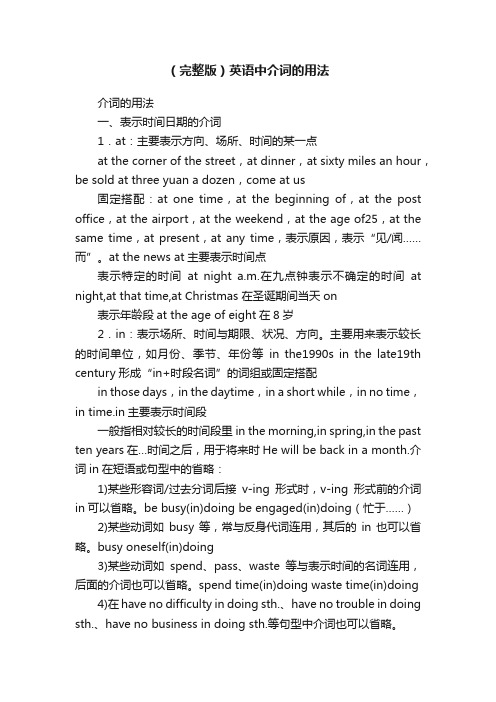
(完整版)英语中介词的用法介词的用法一、表示时间日期的介词1.at:主要表示方向、场所、时间的某一点at the corner of the street,at dinner,at sixty miles an hour,be sold at three yuan a dozen,come at us固定搭配:at one time,at the beginning of,at the post office,at the airport,at the weekend,at the age of25,at the same time,at present,at any time,表示原因,表示“见/闻……而”。
at the news at主要表示时间点表示特定的时间at night a.m.在九点钟表示不确定的时间at night,at that time,at Christmas 在圣诞期间当天on表示年龄段at the age of eight在8岁2.in:表示场所、时间与期限、状况、方向。
主要用来表示较长的时间单位,如月份、季节、年份等in the1990s in the late19th century形成“in+时段名词”的词组或固定搭配in those days,in the daytime,in a short while,in no time,in time.in主要表示时间段一般指相对较长的时间段里in the morning,in spring,in the past ten years在…时间之后,用于将来时He will be back in a month.介词in在短语或句型中的省略:1)某些形容词/过去分词后接v-ing形式时,v-ing形式前的介词in可以省略。
be busy(in)doing be engaged(in)doing(忙于……)2)某些动词如busy等,常与反身代词连用,其后的in也可以省略。
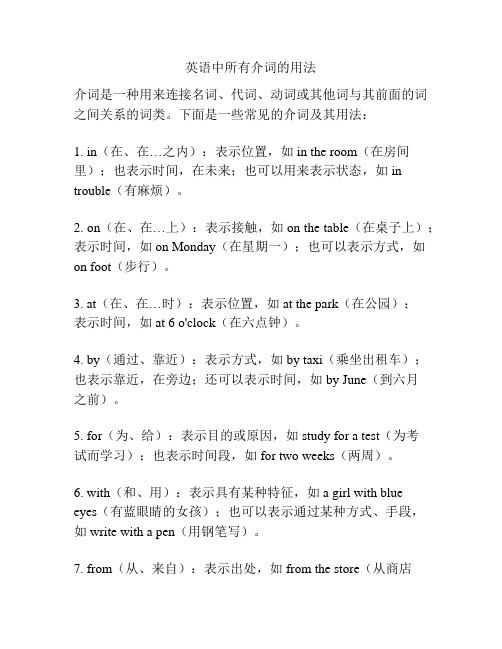
英语中所有介词的用法
介词是一种用来连接名词、代词、动词或其他词与其前面的词之间关系的词类。
下面是一些常见的介词及其用法:
1. in(在、在…之内):表示位置,如in the room(在房间里);也表示时间,在未来;也可以用来表示状态,如in trouble(有麻烦)。
2. on(在、在…上):表示接触,如on the table(在桌子上);表示时间,如on Monday(在星期一);也可以表示方式,如on foot(步行)。
3. at(在、在…时):表示位置,如at the park(在公园);
表示时间,如at 6 o'clock(在六点钟)。
4. by(通过、靠近):表示方式,如by taxi(乘坐出租车);也表示靠近,在旁边;还可以表示时间,如by June(到六月
之前)。
5. for(为、给):表示目的或原因,如study for a test(为考
试而学习);也表示时间段,如for two weeks(两周)。
6. with(和、用):表示具有某种特征,如a girl with blue
eyes(有蓝眼睛的女孩);也可以表示通过某种方式、手段,
如write with a pen(用钢笔写)。
7. from(从、来自):表示出处,如from the store(从商店
里);表示起点,如from London(从伦敦)。
8. to(到、向):表示目的地,如go to school(去学校);表示方向,如face to the north(面朝北方)。
这只是一部分介词的使用方法,介词的用法还有很多,需要根据具体语境来理解和运用。
英语中常见介词用法总结攻击, fire at向…开火,glance at瞟一眼, glare at怒目而视, grieve at忧伤,knock at敲,laugh at嘲笑, look at看一眼, pull at拉扯, rejoice at对…高兴,smile at向某人微笑, shoot at朝…射击, stare at怒目而视,thrust at刺向, tear at撕, tremble at颤抖,wonder at吃惊,work at工作。
例如:Don’t let me catch you again at it.不要再让我当场逮住你。
We must “shoot the arrow at the target”. 我们必须有的放矢。
They trembled at the sight of the peasant’s spears.看到农民的梭标,他们阵阵发抖。
2. be +形容词/过去分词+ at。
其中at表示“情绪、情感的原因,或对某物具有某种感情”:be angry at恼怒于, be alarmed at对…保持警觉,be astonished at对…吃惊, be bad at不擅长, be clever at对某事很灵巧,be delight ed at高兴,be disgusted at厌恶, be disappointed at对…失望,be good at擅长, be impatient at对…不够耐心, be mad at狂热于,be pleased at对…感到高兴, be present at出席, be satisfied at满意,be surprised at吃惊, be shocked at对…非常震惊,be terrified at受到…的恐吓,be quick at对…很机敏。
例如:They were overjoyed at his return to work. 他们对他重返工作感到欣喜。
They are alarmed at the growth of the liberation movement in the colonies.他们对殖民地日益壮大的解放运动警觉起来。
3.at+名词构成的词组:at a distance在一定距离,at a loss不知所措,at a time一次,at all一点也不,at any cost不惜一切代价,at best最好也只是,at first起初,at hand手头,at heart在内心里,at home在家;无拘束,at last最后,at least至少,at most最多,at once马上,at prese nt目前,at sea不知所措,at times有时,at will任意地,at work起作用,at worst最坏。
4.其它含有at的短语:work hard at勤奋工作,drop in at顺路拜访。
四、For1.动词+fora)动词+for。
for表原因、目的:account for解释;说明, answer for对…负责,apply for申请;请求, apologize f or为…而道歉, beg for请求, call for要求,care for在意, enter for报名参加, fight for为…而战, hope for希望,inq uire for查询;求见, leave for离开某地到另一地, look for寻找, long for盼望,mistake for误认为, plan for计划做某事, prepare for为…作准备,provide for为…提供, reach for伸手去拿, run for竞选, stand for象征,search fo r搜寻, send for派人去请, speak for陈述意见、愿望, take for当作, wish for希望, wait for等待。
例如:His illness accounts for his absence. 他因病缺席。
The baby reached for the apple but couldn’t reach it.那婴儿伸手去苹果,但够不着。
He who would search for pearls must dive below.要想找到珍珠,必须潜到海底。
b)动词+sb.+ for +sth.。
for表示原因或目的:ask for要求得到,blame for因…责备, excuse for宽恕, forgive for 谅解, pardon for原谅,pay for花钱买, praise for称赞, punish for对…进行惩罚,push for催逼,reward for酬谢, thank for对…表示谢意。
例如:Please excuse me for my being late. 请原谅我的迟到。
Forgive me for my keeping you waiting. 请见谅,让你久等了。
2. be +形容词+for。
for表作用、目的、对人或物有某种情绪等:be anxious for急于做, be eager for渴望, be b ad for有害于,be convenient for便于, be good for利于, be famous for以…出名,be fit for适合于, be grateful for 对…心存感激, be impatient for对…不耐烦,be late for迟到, be necessary for有必要, be ready for作好准备,be sorry for为…而后悔, be responsible for对…负责,be suitable for适合于, be unfit for不适合, be useful for对…有作用。
例如:He is eager for success. 他渴望成功。
The government is responsible for the nation’s welfare.政府负责民众的福利。
3.for+名词构成的词组:for all尽管,for a song非常便宜地,for certain确切地,for company陪着,for ever 永远,for example例如,for fear以免,for fair肯定地,for free免费,for fun为了好玩,for good永远,for in stance比方,for luck祝福,for life终身,for long长久,for nothing白白地,for once有生第一次,for oneself 替自己,for pleasure为了消遣,for reason因为…理由,for sale供出售,for shame真不害臊,for short简称,for sport好玩,for sure确切地。
4.动词+副词/名词+for构成的短语:be in for将遇到,make up for弥补,go in for从事,l o ok out for提防,ta ke sth. for granted把…当作理所当然,have an ear for音感好, have a gift for有某方面的天赋。
五、From1.动词+froma)动词+ from。
from表示“来源、原因、起始”等:come from来自,date from追溯, depart from违背, die from死于, escape from逃出,fall from自…跌落, hang from垂挂, hear from收到来信,learn from向某人学习, return fro m自某地返回,rise from自…冒出, result from起因于, suffer from忍受。
例如:All the characters in the book are drawn from real life.书中所有的人物都来自于真实的生活。
Any damage resulting from negligence must be paid for by the borrower. 因疏忽引起的任何损坏都应由借用者负责赔偿。
He has recovered from his surprise. 他好不容易回过神来。
b)动词+ sth./sb. +from + sth./ sb. /a place。
from表示“来源、免于”等:borrow from向…借, choose from选自, excuse from免除, keep from阻止做,prevent from不准做, protect from不受…之害, receive from收到,remove f rom移动;除去, save from保全;拯救, separate from分离开来,stop from阻止。
例如:He was excused from attendance at the lecture. 他获准可不去听课。
Stop the child from spoiling the book. 不要让孩子弄坏了书。
2. be +形容词+ from。
此时from含义众多:be absent from缺席,be different from与众不同, be far from更不用说, be hidden from躲避,be made from用…制成, be tired from因…而疲倦。
例如:The boy can’t walk and is far from running.那男孩不会走路,更不用说跑了。
3.from…to…。
本短语表示从一种状态到另一状态的变化或从…到…:from bad to worse每况愈下,from begi nning to end自始至终,from cover to cover从头到尾,from China to Peru到处,from day to day一天一天地,from door to door挨家挨户,from end to end从头至尾,from first to last自始至终,from hand to mouth 勉强糊冢琭rom head to foot从头到脚,from mouth to mouth广泛流传,from sun to sun从日出到日落,from start to finish从头开始,from top to toe从头到脚,from time to time不时地,from top to bottom彻底地。